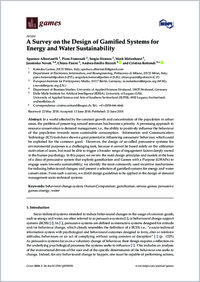Survey on the design of gamified systems for energy and water sustainability
- Albertarelli, Spartaco Kaleidos Games, 20133 Milan, Italy
- Fraternali, Piero Department of Electronics, Information, and Bioengineering, Politecnico di Milano, 20133 Milan, Italy
- Herrera, Sergio Department of Electronics, Information, and Bioengineering, Politecnico di Milano, 20133 Milan, Italy
- Melenhorst, Mark European Institute for Participatory Media, 10117 Berlin, Germany
- Novak, Jasminko European Institute for Participatory Media, 10117 Berlin, Germany - Department of Business Studies, University of Applied Sciences Stralsund, 18435 Stralsund, Germany
- Pasini, Chiara Department of Electronics, Information, and Bioengineering, Politecnico di Milano, 20133 Milan, Italy
- Rizzoli, Andrea-Emilio Istituto Dalle Molle di studi sull'intelligenza artificiale (IDSIA), Facoltà di scienze informatiche, Università della Svizzera italiana, Svizzera
- Rottondi, Cristina Istituto Dalle Molle di studi sull'intelligenza artificiale (IDSIA), Facoltà di scienze informatiche, Università della Svizzera italiana, Svizzera
-
21.06.2018
Published in:
- Games. - 2018, vol. 9, no. 3, p. 38
English
In a world affected by the constant growth and concentration of the population in urban areas, the problem of preserving natural resources has become a priority. A promising approach to resource conservation is demand management, i.e., the ability to positively influence the behaviour of the population towards more sustainable consumption. Information and Communication Technology (ICT) tools have shown a great potential in influencing consumers’ behaviour, which could be exploited for the common good. However, the design of so-called persuasive systems for environmental purposes is a challenging task, because it cannot be based solely on the utilitarian motivation of users, but must be able to trigger a broader range of engagement factors deeply rooted in the human psychology. In this paper, we review the main design principles and models at the base of a class of persuasive system that exploits gamification and Games with a Purpose (GWAPs) to engage users towards sustainability; we identify the most commonly used incentive mechanisms for inducing behavioural changes; and present a selection of gamified systems for energy and water conservation. From such a survey, we distill design guidelines to be applied in the design of demand management socio-technical systems.
- Language
-
- English
- Classification
- Social sciences
- License
- Open access status
- gold
- Identifiers
-
- RERO DOC 328298
- DOI 10.3390/g9030038
- ARK ark:/12658/srd1319011
- Persistent URL
- https://n2t.net/ark:/12658/srd1319011
Statistics
Document views: 231
File downloads:
- Texte intégral: 224
